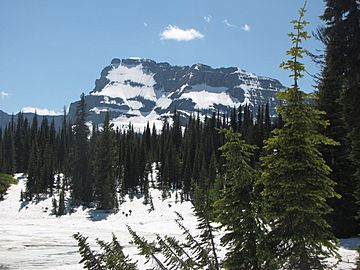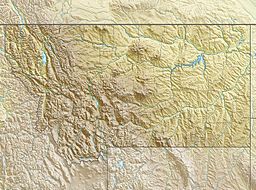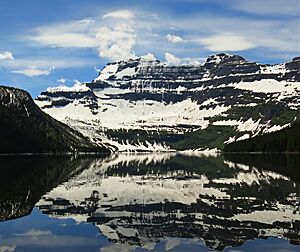Mount Custer facts for kids
Quick facts for kids Mount Custer |
|
|---|---|

Mount Custer from Summit Lake
|
|
| Highest point | |
| Elevation | 8,888 ft (2,709 m) NAVD 88 |
| Prominence | 1,203 ft (367 m) |
| Parent peak | Chapman Peak |
| Geography | |
| Location | Flathead County, Glacier County, Montana, U.S. |
| Parent range | Livingston Range |
| Topo map | USGS Mount Carter, MT |
Mount Custer is a tall mountain in the Livingston Range. It is located inside Glacier National Park in the U.S. state of Montana. The mountain stands about 8,888 feet (2,709 meters) high.
Mount Custer is part of the Continental Divide. This means it helps separate the rivers that flow to the Pacific Ocean from those that flow to the Atlantic Ocean. The mountain rises more than 3,300 feet (1,006 meters) above Lake Nooney. This lake is found below the mountain's peak to the east. The Herbst Glacier is also very close, just northeast of the peak.
What's the Weather Like on Mount Custer?
The weather on Mount Custer is usually very cold. It has a type of weather called a subarctic climate. This means it has long, very cold winters. The summers are short and can be cool or mild.
Temperatures can drop below −10°F (−23°C). With the wind chill, it can feel even colder, sometimes below −30°F (−34°C). This is based on a system called the Köppen climate classification.
How Was Mount Custer Formed?
Like other mountains in Glacier National Park, Mount Custer is made of sedimentary rock. This type of rock forms from layers of sand, mud, and tiny bits of plants and animals. These layers were laid down over millions of years in shallow seas.
The rocks that make up Mount Custer were formed during the Precambrian and Jurassic periods. These are very old times in Earth's history. About 170 million years ago, a huge geological event happened. It was called the Lewis Overthrust. This event pushed a massive slab of old Precambrian rocks over younger rocks. This slab was about 3 miles (4.8 kilometers) thick. It was also 50 miles (80 kilometers) wide and 160 miles (257 kilometers) long. This powerful movement helped create the mountains we see today, including Mount Custer.
 | DeHart Hubbard |
 | Wilma Rudolph |
 | Jesse Owens |
 | Jackie Joyner-Kersee |
 | Major Taylor |




